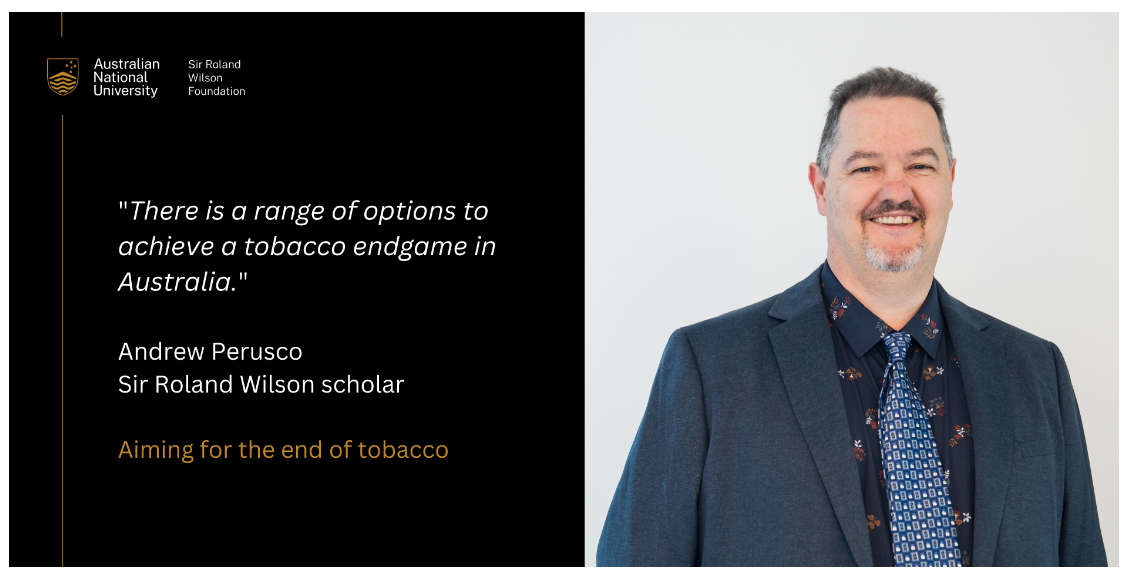Originally posted by Sir Roland Wilson Foundation, Australian National University on 16 November 2023: https://srwfoundation.anu.edu.au/news/aiming-end-tobacco

When was the last time you had a cup of tea, a Bex and a good lie down?
Chances are you probably haven’t.
Marketed in the 1960s to help relax after a stressful day, Bex powders were later linked to cancer and kidney failure. They were banned from sale in Australia in the 1970s.
“There are a number of cases in which harmful substances and products have been removed from the market, or access has been more tightly controlled or monitored,” explains Andrew Perusco.
Andrew is a Sir Roland Wilson scholar from the Department of Health and Aged Care. His research explores why tobacco endgame measures have not been incorporated into Australia’s tobacco control policies, and what might precipitate adoption.
Tobacco endgame policies aim to change or eliminate the structural, political and social dynamics that sustain tobacco use.
Tobacco remains the leading preventable health burden, killing over 20,000 Australians every year.
“Studies conducted as early as the 1930s indicated that tobacco is carcinogenic. Despite the robust and ever-growing evidence, there are very few supply restrictions on commercial tobacco products prepared for smoking. They are still widely available in many retail outlets today,” Andrew says.
As part of his PhD, Andrew is also exploring international endgame research that considers Indigenous peoples. Andrew sees his research as an opportunity to address aspects of inequity and inequality between Indigenous and non-Indigenous Australians.
“There is much higher smoking prevalence among Aboriginal and Torres Strait Islander people than in non-Indigenous Australians. This is partly due to tobacco use being systematically embedded – with Aboriginal and Torres Strait Islander peoples paid in tobacco rations in lieu of wages up until the late 1960s, exclusion from the cash economy and the education system, as well as targeting from the tobacco industry.
“In recent years however, we have seen declines in smoking prevalence. Further opportunities exist to engage Aboriginal and Torres Strait Islander people in creating and implementing structural changes aimed at a tobacco endgame.”
Andrew notes that many tobacco control measures currently used are associated with inequitable outcomes.
“Conventional measures mostly result in a reduction in tobacco use in high socioeconomic status groups, with minimal change among lower socioeconomic groups.
“Equity framing is not emphasised in discourse about the tobacco endgame in Australia, yet modelling shows that endgame policies will rapidly reduce smoking prevalence and markedly reduce inequities.”
Andrew says there is a range of endgame options that could work for Australia, including measures to address the supply of and access to tobacco.
“Monitoring the data on regulation of illicit drugs and pharmaceutical drugs demonstrates that supply and access regulations minimise the total harms to society. Notably, 56 per cent of all drug-related social costs in Australia are attributable to tobacco use.”
Andrew says better communication about the inequities and inequalities resulting from conventional tobacco control measures could assist in policy change, but this needs to be part of a comprehensive suite of activities – including supply reduction measures.
“As with most social change initiatives, multi-faceted approaches are more effective.”
The Sir Roland Wilson scholarship is a three-year, full-pay scholarship for PhD research at ANU for high-performing EL1 and EL2 APS employees.
Image: Kelly Chen photography



